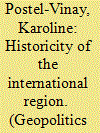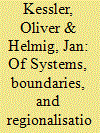| Srl | Item |
| 1 |
ID:
080468


|
|
|
|
|
| Publication |
2007.
|
| Summary/Abstract |
In addition to a geopolitics of containment model of immigration policing at the Mexico-US border, US immigration-related statecraft has incorporated a geopolitics of engagement model in which spaces previously at arms reach from US immigration authorities and at some remove from the border have been aggressively brought into the purview of US immigration enforcement. These newly engaged spaces are at once local (i.e., US cities) and regional (i.e., Mexico, Central America and the Caribbean Basin). This shift has in large part been a response to the tension between trade and security at the border, and thus allows us to see differently how statecraft is being multiplied, reactivated and transformed at and away from the border in light of the war on terrorism and its complex relationship with economic globalisation and the neoliberalisation of the Mexico-US border region.
|
|
|
|
|
|
|
|
|
|
|
|
|
|
|
|
| 2 |
ID:
080465


|
|
|
|
|
| Publication |
2007.
|
| Summary/Abstract |
Although most of the literature on international regionalism refers implicitly to a polity defined by the "idea of the region" it seldom looks at the genesis of this idea in the context of world politics. This article argues that looking at the historical formation of the regional idea is important not only to have a better understanding of international regionalism as such, but to address the issue of Europe's specificity within this trend. There has been an on-going debate about the heuristic status of the European Union (EU) within regional studies, underscoring a widening divide between a somewhat self-introspecting field of EU studies and an international regionalism studies one which provides little insight, other than tautological, on the European experience's singularity. The historical trajectory of the international regional idea shows a fundamental difference between Europe and the rest of world that could explain some otherwise unintelligible structural disparities between the EU and other regional groupings
|
|
|
|
|
|
|
|
|
|
|
|
|
|
|
|
| 3 |
ID:
080466


|
|
|
|
|
| Publication |
2007.
|
| Summary/Abstract |
For the analysis of regionalisation processes, this contribution calls for a mutual engagement between systems theory and critical geopolitics. Based on Luhmann's systems theory, the contribution proposes a framework based on the idea of a world society. This framework points to a changing mode of differentiation where there is an increasing overlap and collision between territorial and functional boundaries. Emphasising the concept of functional differentiation, a multiplicity of overlapping regional logics and forces appears where functional systems create their own 'image' of space. As a consequence, regions are not characterised by their physical or cultural boundaries but by collisions of different rationalities
|
|
|
|
|
|
|
|
|
|
|
|
|
|
|
|
| 4 |
ID:
080467


|
|
|
|
|
| Publication |
2007.
|
| Summary/Abstract |
The often overlooked economic dimensions of the current American national security strategy bridge the military policies of the neo-conservative Bush doctrine with the neo-liberal tendencies of economic globalisation. They do so by explicitly extending control into the "dangerous periphery" of the global economy by strategies that attempt to integrate these regions into the global economy. Reading recent official American defence documents in parallel with commentaries on the war on terror by popular authors Thomas Barnett and Robert Kaplan suggests a broad complementarity of geopolitical categories that link imperial military action directly with neo-liberal globalisation. Both rely on a dichotomous mapping of the world into civilised core and dangerous periphery, categories that reprise earlier imperial mappings of the world and replicate the violent practices of empire
|
|
|
|
|
|
|
|
|
|
|
|
|
|
|
|